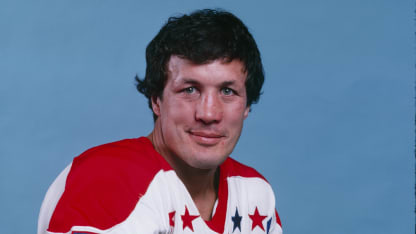The Capitals exchanged youth and promise for leadership and experience when they traded for veteran rearguard, known around the league as Bugsy, on Nov. 30, 1976. For Watson, the team traded away the first-overall pick in the 1974 draft and the first player drafted in club history -
Greg Joly.
Caps Alumni Biographies: Bryan Watson
The Capitals traded for veteran rearguard, known around the league as Bugsy, on Nov. 30, 1976.

By
Washington Capitals
WashingtonCaps.com
The young defenseman was constantly plagued with injuries and did not live up to expectations during his two seasons with the Capitals. And what the team got in return was a 14-year feisty, pesky veteran with a reputation of having a strong lockerroom presence.
And less than a month after the trade was complete, Watson proved just how feisty he could be. On Dec. 17, 1976, he was assessed a holding minor in a 3-2 victory over Toronto, which made Watson the first player in NHL history to acquire 2,000 penalty minutes during a career.
The Capitals released Watson after three seasons with the team thus ending his 17-year NHL career. He left the league as its all-time penalty minute leader with 2,176 minutes. Watson will also be remembered for his enormous amount of charitable work during his time with the league.
His passion for working with the Special Olympics earned him the organization's 1978 International Athlete of the Year award. That year, he was also awarded the Charlie Conacher Trophy for the NHL player who made the biggest contribution to humanitarian causes.
As a youngster growing up in the mining town of Bancroft, Ontario, Bryan Watson's father felt that his son's sporting options were too limited for his youthful ambition. To enrich his environment, he sent Bryan to live with his grandparents in Peterborough at the age of 13.
There, young Watson progressed up the ranks to join the Peterborough Petes of the OHA where he played from 1960 to 1963. He then turned pro and embarked on a lengthy career of musical sweaters, changing uniforms 15 times over the 16 seasons that followed. It seems that his very specific style of play tended to be, for the most part, coveted by teams for only short periods of time.
Watson had the face of a light heavyweight boxer with plenty of scars and a warm smile to soften his tough-guy looks. He was small in stature but backed away from no one. He was an average skater at best who had little scoring touch around the net. But his value came in his refined art of clutching, grabbing and clinging tactics that he used to effectively blanket and antagonize opponents.
In 1966, during a semi-finals game against the Blackhawks, Watson, as a Red Wing, bothered Bobby Hull like an irritating rash, holding the power winger to only one goal in the series. Hull named his persistent antagonist "Super Pest."
In spite of his defensive skills, Watson spent most of the sixties bouncing between the minors and the majors. At the NHL level, he put in two short stints with the Canadiens, a two-year outing with the Wings, and a short visit with the Seals.
It wasn't until the Pittsburgh Penguins acquired his services in 1969 that he finally settled into his spiritual home. With the Pens, Watson took his game of antagonism to its height. Over his five-plus seasons with the club, he played with combative consistency. Although he only led the NHL in single-season penalty minutes once, he managed to eventually become the league's all-time penalty-minute king until Dave Schultz and Tiger Williams shattered his mark sometime later.
In 1974, Watson moved on to the St. Louis Blues for a brief spell before joining the Red Wings for a second time. He continued with his tradition of hustle and crime for two-and-a-half seasons in the Motor City. He was then traded to his final NHL stop in Washington where he left the league for good in 1979. The rugged rearguard put in a brief outing with the Cincinnati Stingers of the WHA and then retired from on-ice duty at the end of the season.
Watson then joined the Edmonton Oilers as an assistant and then as an ill-fated head coach. He lasted only a brief time behind the bench before being fired. The event marked the end of his association with pro hockey.


















